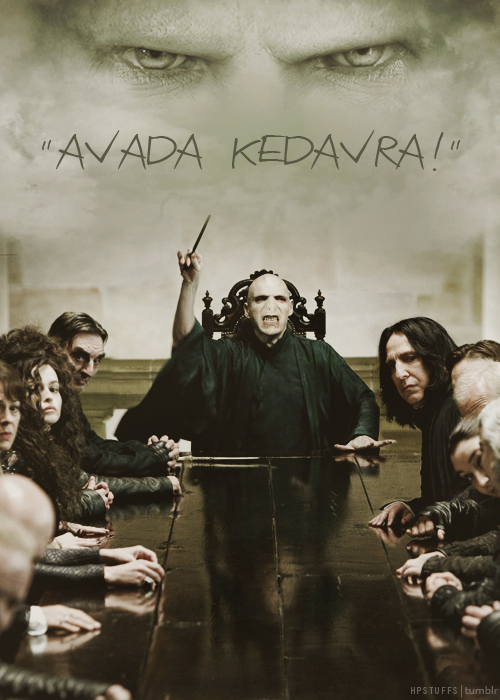
Harry Potter Psychotherapy: Death Anxiety
*I do not own Harry Potter, therefore, mention of characters/concepts are solely intended for educational and therapeutic gain.*
A fear of death is a healthy protector for many, however, some take it too far by limiting their experiences or making unhealthy choices. There are many complex layers to death anxiety. Some fear potential pain associated with dying. Others fear the unknown of what will happen to them after they die. Themes include, forgotten legacy, lack of power, irrelevance, loss of control, nothingness, divine justice, and being alone.
Death anxiety was often explored in the Harry Potter series, mostly through Lord Voldemort’s character. Voldemort meets criteria for a diagnosis of Antisocial Personality Disorder due to various behaviors reported throughout the books (such as animal abuse, hurting others, stealing, lying, lack of remorse and empathy, etc.) Due to his personality disorder, Voldemort handled his death anxiety in an unhealthy way. As a Hogwarts student, Tom Riddle (Voldemort’s given name) was obsessed with finding a way to split his soul into seven pieces in order to live forever. Splitting one’s soul involves killing a person and attaching the soul to an object. Above all, Tom valued power and immortality. In French, “vol” means flight, “de” signifies from, and “mort” is death. Put together, Voldemort means “flight from death”, an accurate depiction of his internal struggle.
How do we help Tom through his existential crisis?
According to Yalom, existential therapy challenges the anxiety experienced through confrontation of the givens of existence. Anxiety arises from living or dying, freedom, responsibility or choice, isolation or loving, and meaning or meaninglessness. In attempting to be immortal, Tom was avoiding the inevitability that he would eventually die. In being immortal, Tom would have escaped his perceived consequences from his misdeeds. Tom’s behavior would not have improved until he could understand that dying was inevitable, regardless of power. Additionally, Tom’s desire to murder may have reflected his curiosity and obsession with death. Tom’s lack of empathy and aversion to interpersonal connection would make this next part difficult, however, he desperately lacked a healthy meaning or purpose in his life. His main drive was to wield power over others, repress non-magical or muggle-born individuals, and live forever. Viktor Frankl practiced logotherapy, a therapy intervention focusing on helping individuals find their own personal life meaning and purpose. Without it, individuals often feel lost or depressed.
Enough about Moldy Voldy, what does this mean for me?
The matter of what happens after death can’t be answered here. However, it is certain that a fulfilled life experiences some form of meaning or purpose (unique to each person). It is helpful to consider Yalom’s givens of existence: living/dying, freedom, responsibility/choice, isolation/loving, and meaning/meaninglessness. Don’t be afraid to discuss these complex topics with open-minded friends and family. Practice exploring these topics by journaling or discussing the following questions:
- Imagine yourself at age 85.
- What would you like to claim as an accomplishment(s) when looking back on your life?
- What makes those accomplishments meaningful?
- What would you like your relationships to look like with friends and family?
- How do those answers compare with your present situation or lifestyle?
- What are some realistic steps you can take toward achieving that version of you at age 85?
- What are some of your best qualities?
- What is freedom?
- Is there a cost?
- What cost are you willing to pay?
- What does the word ‘responsibility’ bring up for you?
- Describe your relationship with responsibility.
- How do you feel about change?
- Is that view helping or hurting you?
- What is love?
- Do you feel more experienced with love or isolation?
- Answer this question within different categories of relationships (such as family, friends, romance, etc.)
- What role do your relationships have in your life?
- Do your interpersonal connections bring you overall enjoyment? How do they compare?
- What is the significance of meaning vs. meaninglessness?
- How do these concepts relate to potential current life struggles?
- Do you think you hold accurate views of your own meaning?
- What do others say about your opinions of yourself?
- If you had a magic wand, what would you change to make your life better now?
- Change is not necessarily the key to happiness. We could always come up with things that need to change in order for life to be better. There’s no guarantee of tomorrow.
- Given the tools and current realities in your life, what can you utilize to make enjoyment and meaning for your life today?
Yalom, V., & Bugental, J.T. (1997). Support in existential-humanistic psychotherapy. Journal of Psychotherapy Integration, 7(2), 119-128.
Please note that these therapy exercises do not qualify as stand-alone treatments and it is recommended that you seek help from a licensed professional mental health provider.
Contact me with questions or to schedule an appointment:
E-Mail: jmorris@jmmhc.com
Voicemail: (248) 327-4643





Write a Comment